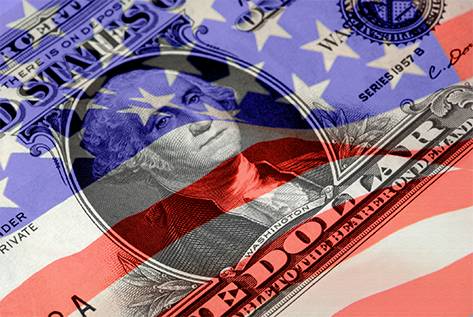The dollar rose slightly on Tuesday, but activity in the currency market remained subdued, as investors awaited any signs of progress in negotiations ahead of the August 1 deadline, which could see hefty tariffs imposed on US trade partners that fail to strike deals with Washington.
The Japanese yen held on to most of its gains from the previous session, following the results of Japan’s upper house elections held over the weekend, which came in line with expectations, easing concerns in the markets. Focus is now on how quickly Tokyo can reach a trade agreement with Washington, and on the future of Prime Minister Shigeru Ishiba’s leadership.
With just over a week left until August 1, US Treasury Secretary Scott Besant said on Monday that the US administration is more concerned with the quality of trade agreements than their timing.
When asked whether the deadline could be extended for countries engaged in constructive negotiations with Washington, Besant said President Donald Trump would be the one to make that decision.
Uncertainty over the final shape of global tariffs has paralyzed foreign exchange markets, with currencies remaining confined to tight trading ranges, even as US stocks continue to post record highs.
Thierry Wizman, global currency and interest rate strategist at Macquarie Group, said: “Nothing that happens on August 1 is necessarily permanent, as long as the US administration remains open to dialogue, as suggested in Trump’s messages two weeks ago.”
The euro slipped slightly to $1.1692. The market is also awaiting the European Central Bank meeting this week, although it is not expected to change interest rates in the eurozone.
Stalled talks between Washington and Brussels
Reaching a trade agreement between the European Union and the United States remains out of reach, as the bloc could face tariffs of up to 30% starting August 1. European diplomats said on Monday that they are considering a broader range of countermeasures as hopes for an agreement fade.
Francesco Pesole, currency strategist at ING Bank, said: “The Trump administration has shown little tolerance for retaliatory actions, and there’s a risk that matters could escalate (even if temporarily) into a tit-for-tat tariff spiral. The euro’s ability to hold its ground against the dollar amid tariff tensions will depend on the scale of escalation and whether the EU ends up worse off compared to other countries that succeed in striking deals with Washington.”
Separately, the European Central Bank said in a survey published Tuesday that demand for corporate loans in the euro area improved in the past quarter, and is expected to continue improving in the current quarter, despite tariff threats and rising geopolitical tensions.
The dollar index – which measures the performance of the US currency against a basket of currencies – rose by 0.1% to 97.91, after falling by 0.6% on Monday.
Concerns over Federal Reserve independence
Investor concerns over the independence of the US Federal Reserve also persisted, especially with Trump continuing his attacks on Fed Chair Jerome Powell and calling for his resignation over the bank’s refusal to cut interest rates.
Jonas Goltermann, deputy chief economist at Capital Economics, said: “Our base case is that strong US economic data, along with inflation boosted by tariffs, will lead the FOMC to keep interest rates unchanged until 2026, which will widen the interest rate differential in favor of the dollar and support its recovery in the coming months.”
He added with a warning: “However, that outlook remains at the mercy of White House volatility.”
The Japanese yen in focus
The Japanese yen remained in focus on Tuesday, as it slipped slightly to 147.64 yen per dollar, after rising by 1% on Monday following the elections and Japan’s public holiday.
Lee Hardman, senior currency analyst at MUFG Bank, said: “The initial relief for the yen – due to the ruling coalition not losing more seats, and Prime Minister Ishiba holding on to power – is likely to be short-lived.”
He added: “Rising political uncertainty in Japan may complicate efforts to reach a timely trade agreement with the United States, posing downside risks for the Japanese economy and the yen.”


